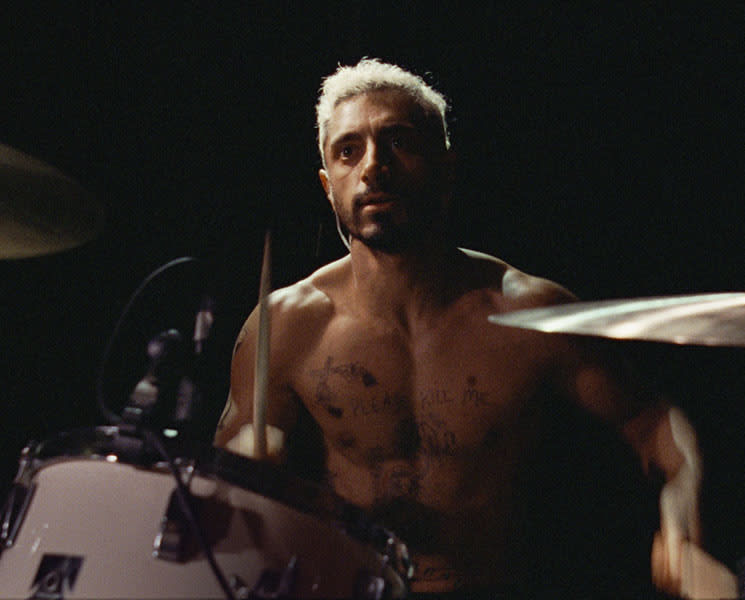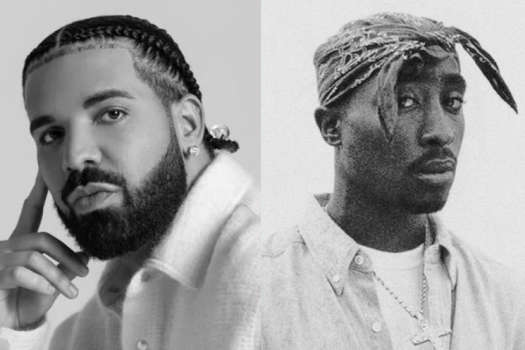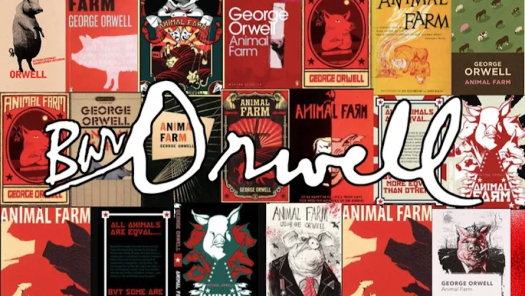Sound of Metal starts off loud, but hits its full power in silence. This debut feature from Darius Marder is an inventive exploration of acquired deafness, anchored by a strong directorial style and nuanced performances from its leads.
Riz Ahmed (Nightcrawler, Rogue One, acclaimed rap crew Swet Shop Boys) stars as Ruben, the drummer in a two-piece noise rock outfit — think an artier Japandroids or less-weird Lightning Bolt. Night after night of punishing performances finally takes its toll on Ruben when his tinnitus turns into permanent hearing loss, propelling him on a journey of self-discovery as he grapples with his new identity.
Ahmed absolutely nails his portrayal of Ruban, a four-years-sober drug addict whose meticulously healthy regime on the road is completely upended by the sudden end of his drumming career. Clad in tattered band tees and hoodies, his surly demeanour is given plenty of depth by Ahmed. He's balanced out by his co-stars in Olivia Cooke as his girlfriend/bandmate Lou and Paul Raci as Joe, the leader of a recovery house for deaf addicts (though Raci himself is hearing, he has long been an advocate for deaf and hard-of-hearing folks, and is a child of two deaf parents).
Marder's attempts at weaving accessibility into the film as a viewing experience showcases the delicateness with which he treats the film's themes. All screenings of the film come with closed captioning — more than just subtitles — and the audio is selectively treated to mirror Ruben's condition. During scenes where non-signing Ruben is living in deaf communities, there are no subtitles — the only ones who can make sense of the many conversations unfolding are those who know ASL.
Though the film's pacing begins to lag in its final acts, Sound of Metal is ultimately an empowering look at accessibility, and explores the struggles of acquired deafness without devolving into tokenizing or lionizing. It's about addiction just as much as it is about deafness and disability, and about the difficulties in overcoming intersecting conditions. For his first feature, Marder's work was cut out for him, but his strong directorial vision rings through clearly.
(Caviar)Riz Ahmed (Nightcrawler, Rogue One, acclaimed rap crew Swet Shop Boys) stars as Ruben, the drummer in a two-piece noise rock outfit — think an artier Japandroids or less-weird Lightning Bolt. Night after night of punishing performances finally takes its toll on Ruben when his tinnitus turns into permanent hearing loss, propelling him on a journey of self-discovery as he grapples with his new identity.
Ahmed absolutely nails his portrayal of Ruban, a four-years-sober drug addict whose meticulously healthy regime on the road is completely upended by the sudden end of his drumming career. Clad in tattered band tees and hoodies, his surly demeanour is given plenty of depth by Ahmed. He's balanced out by his co-stars in Olivia Cooke as his girlfriend/bandmate Lou and Paul Raci as Joe, the leader of a recovery house for deaf addicts (though Raci himself is hearing, he has long been an advocate for deaf and hard-of-hearing folks, and is a child of two deaf parents).
Marder's attempts at weaving accessibility into the film as a viewing experience showcases the delicateness with which he treats the film's themes. All screenings of the film come with closed captioning — more than just subtitles — and the audio is selectively treated to mirror Ruben's condition. During scenes where non-signing Ruben is living in deaf communities, there are no subtitles — the only ones who can make sense of the many conversations unfolding are those who know ASL.
Though the film's pacing begins to lag in its final acts, Sound of Metal is ultimately an empowering look at accessibility, and explores the struggles of acquired deafness without devolving into tokenizing or lionizing. It's about addiction just as much as it is about deafness and disability, and about the difficulties in overcoming intersecting conditions. For his first feature, Marder's work was cut out for him, but his strong directorial vision rings through clearly.




